After its initial run, the Portland Bureau of Transportation is calling their Adaptive Biketown program a success and plans to bring it back this spring.
The program launched in July of last year and ran through the end of October. According to PBOT stats released last month, there were 59 total rentals to 27 unique participants.
One of the people who used the service was Chris Pangilinan. He was profiled in a PBOT blog post and said the experience, “Opened up a whole new world for me to explore Portland, spend time with friends, and get exercise.” Here’s more from Panilinan via PBOT:
Chris surprised himself when he and his friend Jeff Mack rode all the way to Milwaukie and back (over 11 miles!). For Chris, being able to ride is “hugely important… It’s indescribable what the freedom is like to get on a bike if you’ve never been on one before. Most people take it for granted, because they grew up on one, but to go from wheelchairing and riding buses to actually riding a bike is just a whole new level. And I’m not even going to even try to describe it, because I can’t, you have to go do it yourself to understand!”
Advertisement
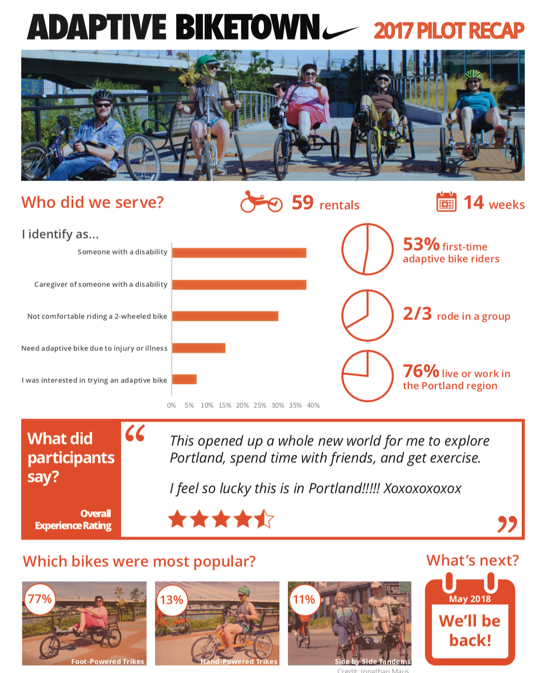
And here are a few more stats released by PBOT:
— 68% of participants qualified for a discounted rate (people with disabilities, Medicare recipients, seniors, or self-identified as unable to ride a traditional two-wheeled bicycle)
— 53% of riders surveyed said it was their first time riding an adaptive bike
— 2/3 of riders surveyed said they rode in a group
— 76% of riders surveyed said they live or work in the Portland region
The program will be offered again starting May 1st and the bikes will be available for test rides at all five upcoming Sunday Parkways events.
PBOT launched Adaptive Biketown as an extension of its bike share program in response to criticisms that it wasn’t accessible to people with disabilities. The adaptive bikes were rented out by Kerr Bikes, a nonprofit that operates a rental shop on the Eastbank Esplanade path near OMSI. For more on the program check out our related posts below and visit PBOT’s website.
For more on the use of bicycles by people with disabilities, check out this article published today by The Guardian, ‘A rolling walking stick’: why do so many disabled people cycle in Cambridge?.
— Jonathan Maus: (503) 706-8804, @jonathan_maus on Twitter and jonathan@bikeportland.org
Never miss a story. Sign-up for the daily BP Headlines email.
BikePortland needs your support.



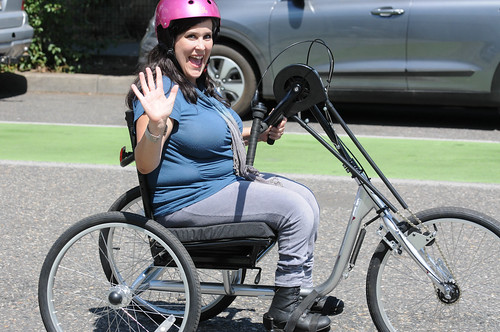
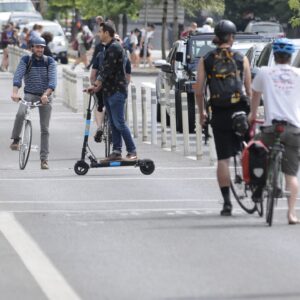

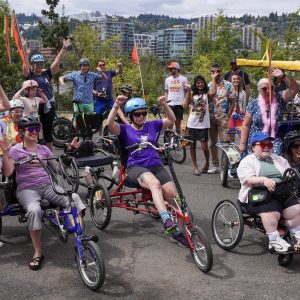
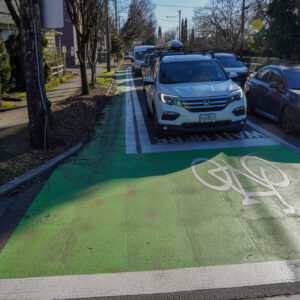
Thanks for reading.
BikePortland has served this community with independent community journalism since 2005. We rely on subscriptions from readers like you to survive. Your financial support is vital in keeping this valuable resource alive and well.
Please subscribe today to strengthen and expand our work.
Great news, I am very proud of PBOT for pulling this off in an efficient, thoughtful manner.
Thanks for following up on this subject. Great to hear about the program continuance. Hope my monthly subscription fees are used to support the program.
Also, great link to The Guardian article. Did you catch the link to the UK’s Green Commute Initiative?? I quickly delved into the FAQ, and, you can “repurchase” your bike for £1?? Jonathan, can you investigate this program further and share with us all?
Personally, I get ill when I hear/read about all the government financial incentives to buy cars. Yet, nothing for those who actively choose bicycling for their transportation needs.
Is it actually efficient? The program had 4 rentals a week, renting to 2 new persons a week. So how much did it cost? We can’t know if it was efficient or cost-effective, without reporting on the costs. Which isn’t mentioned in the PBOT press release.
Found it, the PBOT website says the program cost $40,000. That includes buying the bikes. Perhaps it can cost much, much less to run it on an ongoing basis. A subsidy of $700 per rental is untenable, but maybe $10 per rental is okay.
27 participants for a program that cost $40,000. You could almost give each participant a bike with the money spent on this program. Your tax money at work. I would much rather the city had spent some money on sweeping the gravel off the bike lanes on Terwilliger.
Thanks, Chloe.
I said at the beginning that it would make more sense to provide purchase subsidies. This is what you get when you elect people that are financially inept.
Because of the program those folks NOW know IF / HOW they can ride. And I think most people will buy their own wheels in the future.
Large barriers to that. Adaptive bikes (trikes) are very expensive and not easily carried up stairs or transported on a car.